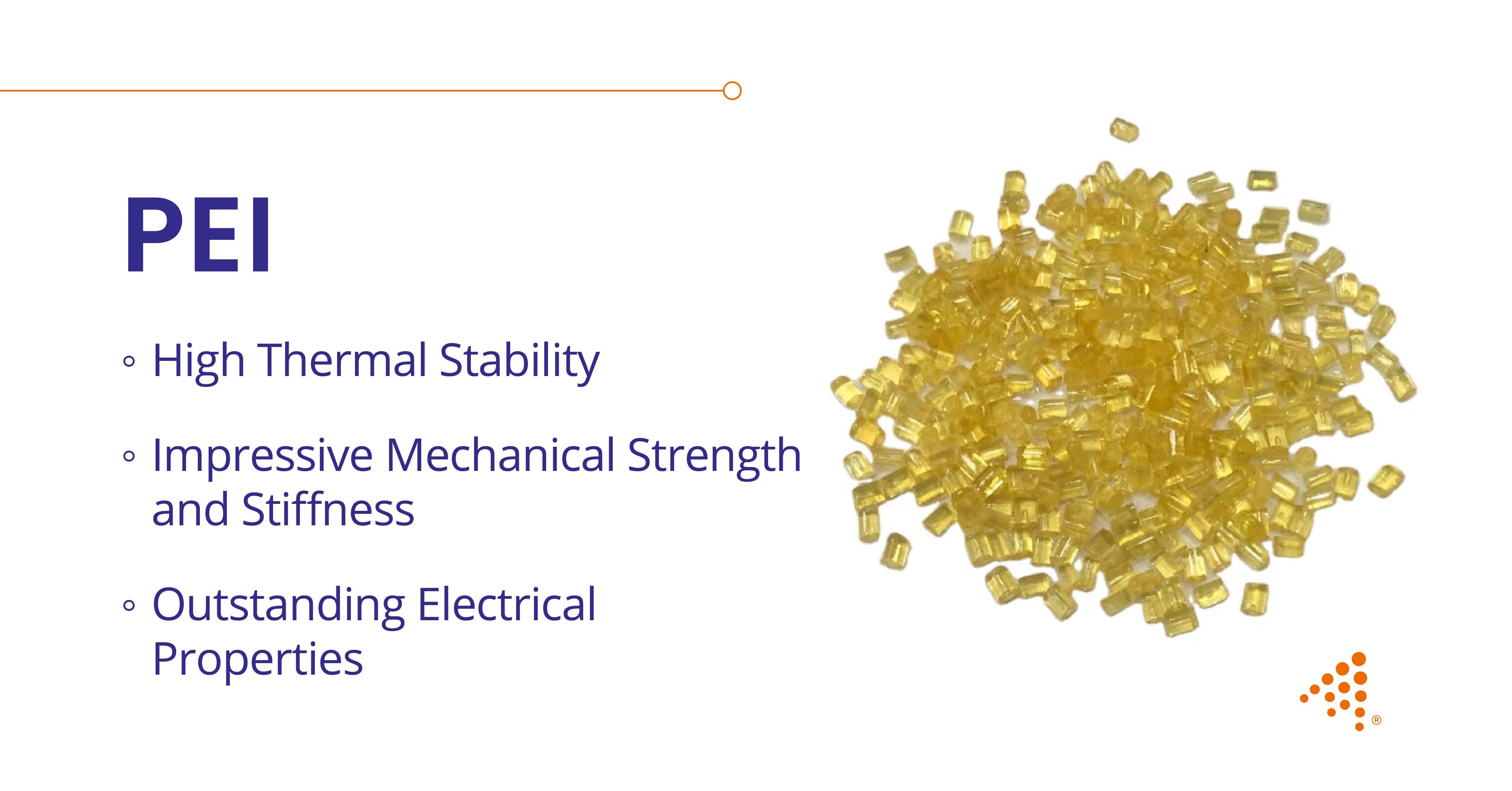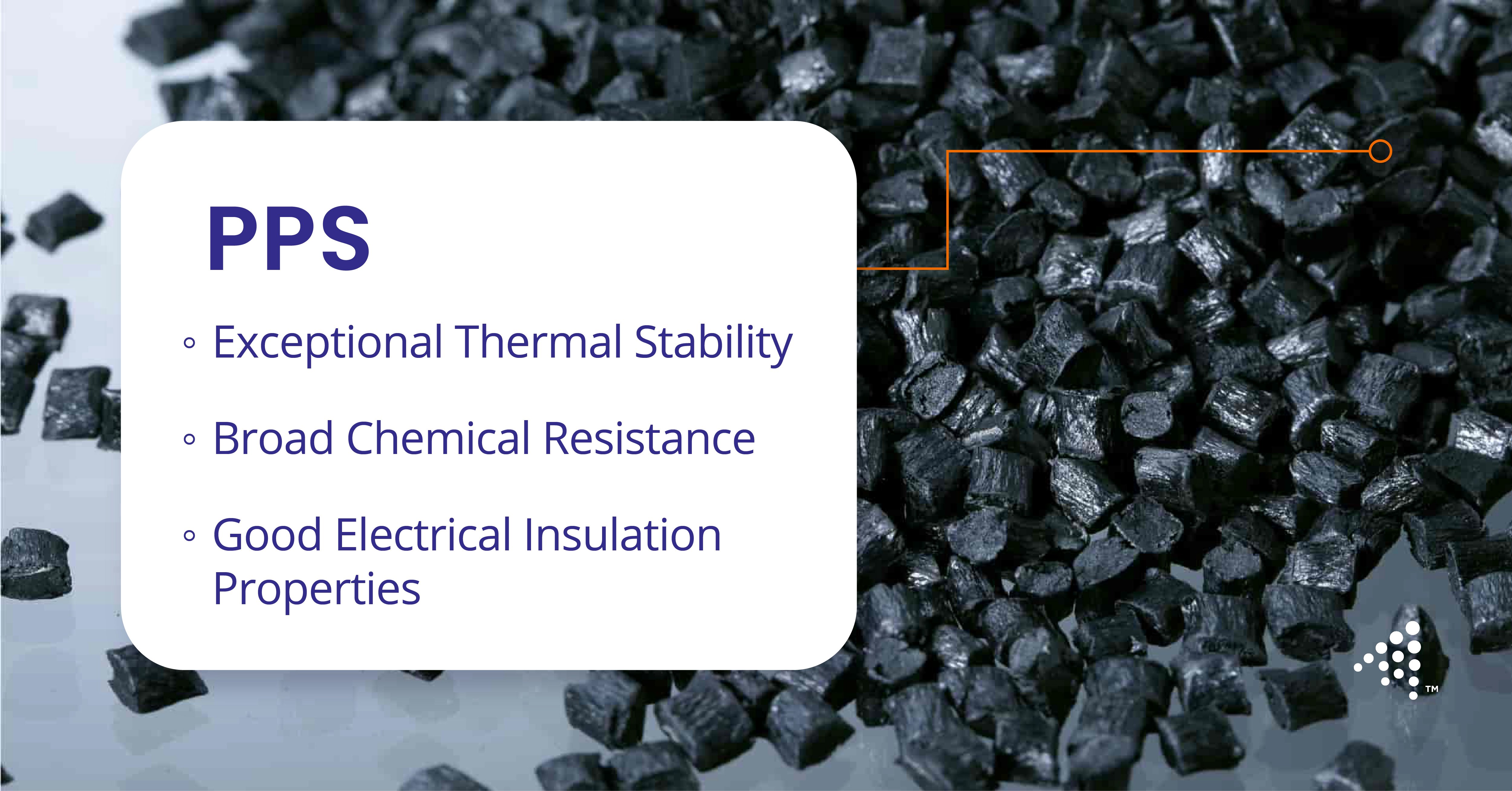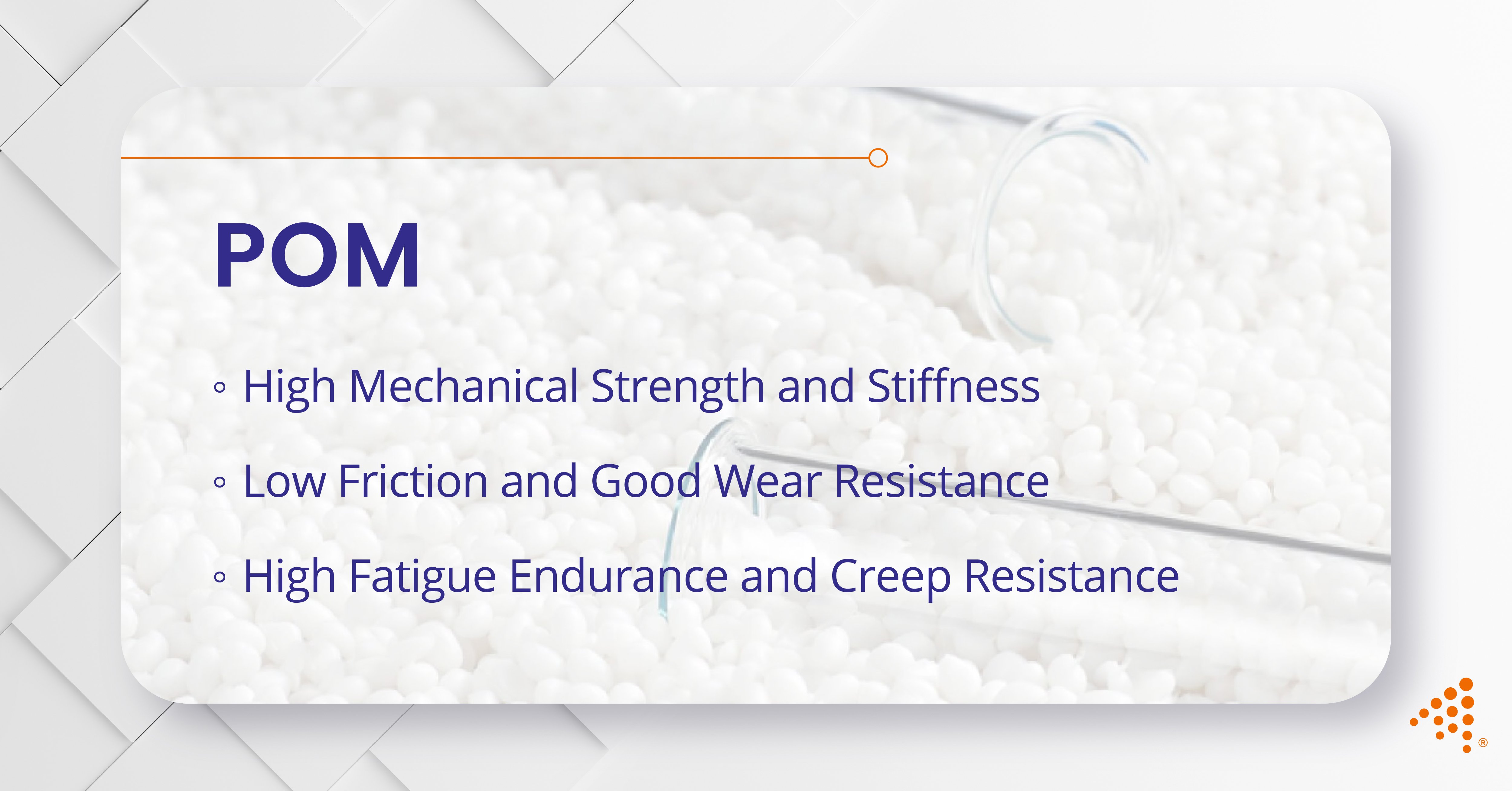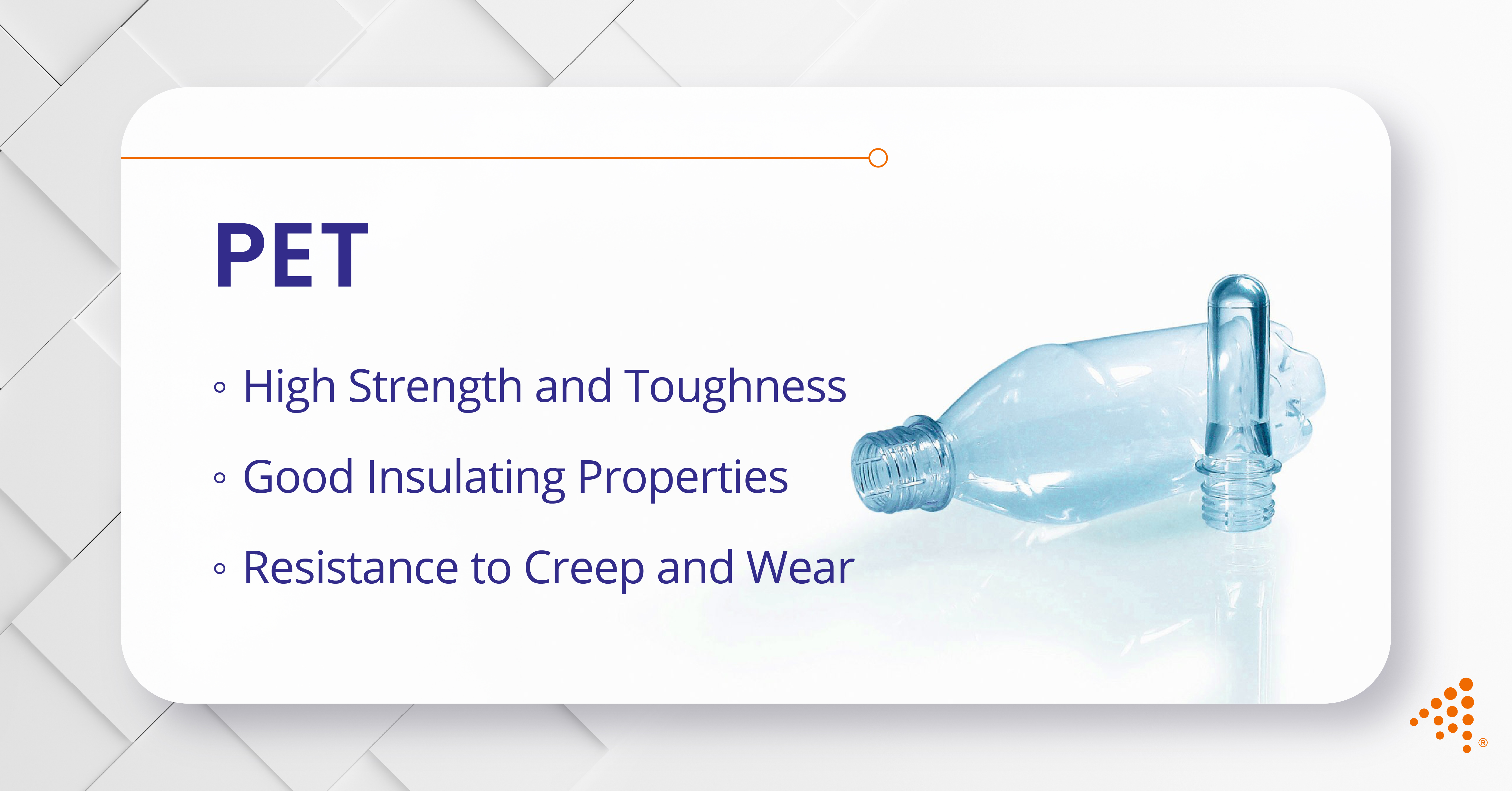Polyphenylene Sulfide (PPS): Resin for Extreme Conditions
Polyphenylene Sulfide (PPS) is a high-performance, semi-crystalline engineering thermoplastic known for its remarkable thermal stability, chemical...
5 min read
Nick Erickson : Jun 23, 2025 8:41:00 AM

Polyetherimide (PEI) is a high-performance amorphous thermoplastic known for its impressive combination of thermal stability, mechanical strength, chemical resistance, and electrical insulation properties. Frequently used in Custom Injection Molding Solutions, PEI is ideal for demanding environments that require high-performance plastic injection molding services.
PEI stands out among thermoplastics due to its robust property profile, allowing it to function reliably in extreme conditions where many other plastics would fail.
PEI exhibits remarkable heat resistance, with a high glass transition temperature around 422°F (217°C) and a continuous service temperature up to approximately 340°F (170°C). This allows PEI parts to maintain structural integrity and dimensional stability even during repeated high-temperature sterilization cycles, such as autoclaving. Its heat deflection temperature, especially for glass-filled grades, can reach up to 410°F (210°C) under load.
Even without reinforcement, PEI demonstrates high tensile strength (around 15,200-16,000 psi) and stiffness (Flexural Modulus ~480,000-520,000 psi). It also shows good creep resistance, meaning it resists deformation under sustained loads, particularly at elevated temperatures. This mechanical robustness makes it suitable for structural components and replacing metal in certain situations.
PEI offers substantial resistance to hydrolysis when exposed to hot water and steam, allowing it to withstand repeated sterilization cycles without significant degradation. This stability is crucial for reusable medical devices and food processing equipment that undergo frequent cleaning.
PEI withstands exposure to a variety of chemicals, including most automotive and aircraft fluids, aliphatic hydrocarbons, alcohols, acids, and weak aqueous solutions. While it is susceptible to certain chlorinated solvents and strong alkalis, its overall chemical resistance is superior to many other amorphous thermoplastics.
PEI possesses one of the highest dielectric strengths of any commercially available thermoplastic, making it an exceptional electrical insulator. Its dielectric constant and dissipation factor remain stable over a wide range of temperatures and frequencies, beneficial for connectors, housings, and high-voltage components.
PEI naturally exhibits flame resistance and low smoke generation without requiring flame-retardant additives. It typically carries UL94 V-0 and 5VA ratings, meeting stringent fire safety standards for applications in aerospace, automotive, and electrical sectors.
With low moisture absorption (around 0.25% after 24 hours immersion) and a low, uniform coefficient of thermal expansion, PEI maintains its shape and size well across varying temperatures and humidity levels. This is vital for precision parts used in injection molding processes.
Explore our Design for Manufacturing Solutions to optimize your plastic part design for both performance and production.
At Aprios, our design and manufacturing services are tailored to help clients across medical, aerospace, and industrial sectors implement high-performance materials like PEI. Whether you're developing Medical Device Prototypes or working on complex assemblies for aerospace, our experience with Design for Injection Molding (DfIM) and plastic injection mold design services ensures optimal part performance and production efficiency.
PEI is widely utilized for reusable medical devices that require sterilization via autoclave, gamma radiation, or ethylene oxide (EtO). Biocompatible grades, often meeting USP Class VI requirements, are available for surgical instruments, handles, probes, trial implants, and diagnostic equipment components. Its hydrolytic stability makes it ideal for parts exposed to bodily fluids or repeated cleaning protocols in medical injection molding.
In aerospace, PEI's high strength-to-weight ratio, inherent flame retardancy, low smoke emission, and resistance to aviation fluids are highly valued. It is used for interior components like seating parts, tray tables, and trim, as well as electrical connectors and housings where fire safety is paramount.
Under the hood, PEI replaces metal or lower-performing plastics in components needing high heat resistance and exposure to automotive fluids. Common uses include transmission parts, throttle bodies, thermostat housings, ignition components, sensors, and connectors. It is also found in lighting components like reflectors and bezels due to its heat tolerance.
Thanks to its superior dielectric strength and dimensional stability, PEI is frequently specified for electrical insulation parts, connectors, sockets, circuit boards (including Molded Interconnect Devices - MIDs), bobbins, and housings for sensitive electronic equipment.
FDA-compliant grades of PEI are suitable for food contact. Its resistance to steam, hot water, and cleaning agents makes it useful for reusable food trays, catering equipment, and microwave cookware—all of which can benefit from Low-Volume Injection Molding or Prototype Injection Molding during product development.
PEI's chemical resistance and mechanical strength lend themselves to components in challenging industrial settings, such as pump parts, valves, manifolds, and sight glasses that handle aggressive fluids or operate at elevated temperatures.
Read More About The Ultimate Guide to ABS for High-Performance Manufacturing
While standard PEI offers remarkable performance, its properties can be further tailored using various additives and reinforcements to meet specific requirements.
Adding glass fibers (commonly 10% to 40% by weight) significantly increases PEI's rigidity, tensile strength, dimensional stability, and heat deflection temperature. Glass-filled grades (like Ultem™ 2100, 2200, 2300) are often chosen for structural components requiring maximum stiffness and load-bearing capability.
For enhanced strength, stiffness, and potentially improved conductivity or static dissipation compared to glass fill, carbon fibers can be incorporated into PEI.
Minerals can be added to modify properties such as dimensional stability, stiffness, or to achieve specific surface characteristics or densities. Ceramic-filled grades have been developed for electronic uses needing specific electrical properties.
Adding lubricants like Polytetrafluoroethylene (PTFE) creates grades (such as Ultem™ 4001) with significantly improved wear resistance and a lower coefficient of friction. These are ideal for bearings, bushings, wear pads, and other components subjected to dynamic loads or sliding contact.
Although PEI has inherent UV resistance, stabilizers can be added to further enhance its performance and longevity in outdoor applications or environments with prolonged UV exposure.
PEI is naturally amber/transparent but can be compounded with pigments to achieve various opaque colors for aesthetic purposes or functional identification, though color options might be more limited compared to other plastics.
Read More About Guide to Polypropylene (PP): A Versatile Material for Manufacturing
Despite its many strengths, PEI has some limitations that designers and engineers should consider.
As a high-performance thermoplastic, PEI is significantly more expensive than commodity plastics and many standard engineering plastics. Its use is generally reserved for components where its specific high-performance characteristics are necessary and justify the cost.
PEI requires very high processing temperatures for injection molding (typically melt temperatures between 662°F (350°C) and 770°F (410°C) and mold temperatures between 275°F (135°C) and 356°F (180°C)). This necessitates equipment capable of handling these temperatures and careful process control. Proper drying is also crucial as PEI is hygroscopic.
While generally exhibiting broad chemical resistance, PEI is susceptible to attack and potential stress cracking when exposed to certain chemicals, notably polar chlorinated solvents (like methylene chloride), strong alkalis, and some concentrated acids or aromatic hydrocarbons. Environmental stress cracking (ESC) can occur when parts are under load in these chemical environments.
Compared to some other high-performance polymers like PEEK, PEI can be more notch-sensitive and may exhibit lower impact strength, particularly unmodified grades. It can also become more brittle at very low temperatures.
Due to its natural amber hue, achieving certain vibrant or light colors can be challenging compared to clearer or more easily pigmentable base resins.
Use our Material Selection Tool or consult with our experts to discover which design for manufacturing solutions align with your product goals.
PEI is selected when an application demands a combination of high continuous operating temperature, excellent mechanical strength and rigidity, dimensional stability, inherent flame retardancy, and stable electrical properties that commodity or standard engineering plastics cannot provide. Its ability to withstand repeated sterilization cycles, particularly steam autoclaving, makes it invaluable in the medical device industry. The availability of biocompatible grades further solidifies its position for healthcare-related uses. Through our Custom Manufacturing Services and ISO-Certified Manufacturing, Aprios supports clients in achieving precision, durability, and regulatory compliance. Whether you're in need of Low-Volume Injection Molding or Rapid Prototyping Services, we provide end-to-end support—from concept to production.
Contact Aprios for expert guidance and turnkey injection molding services designed to meet your toughest design and manufacturing challenges.
You can also view our Material Selection tool.

Polyphenylene Sulfide (PPS) is a high-performance, semi-crystalline engineering thermoplastic known for its remarkable thermal stability, chemical...

Polyoxymethylene (POM), commonly known as acetal or polyacetal, is a high-performance engineering thermoplastic celebrated for its impressive...

Polyethylene Terephthalate (PET) is a widely used thermoplastic resin known for its strength, chemical resistance, and versatility in high-volume...